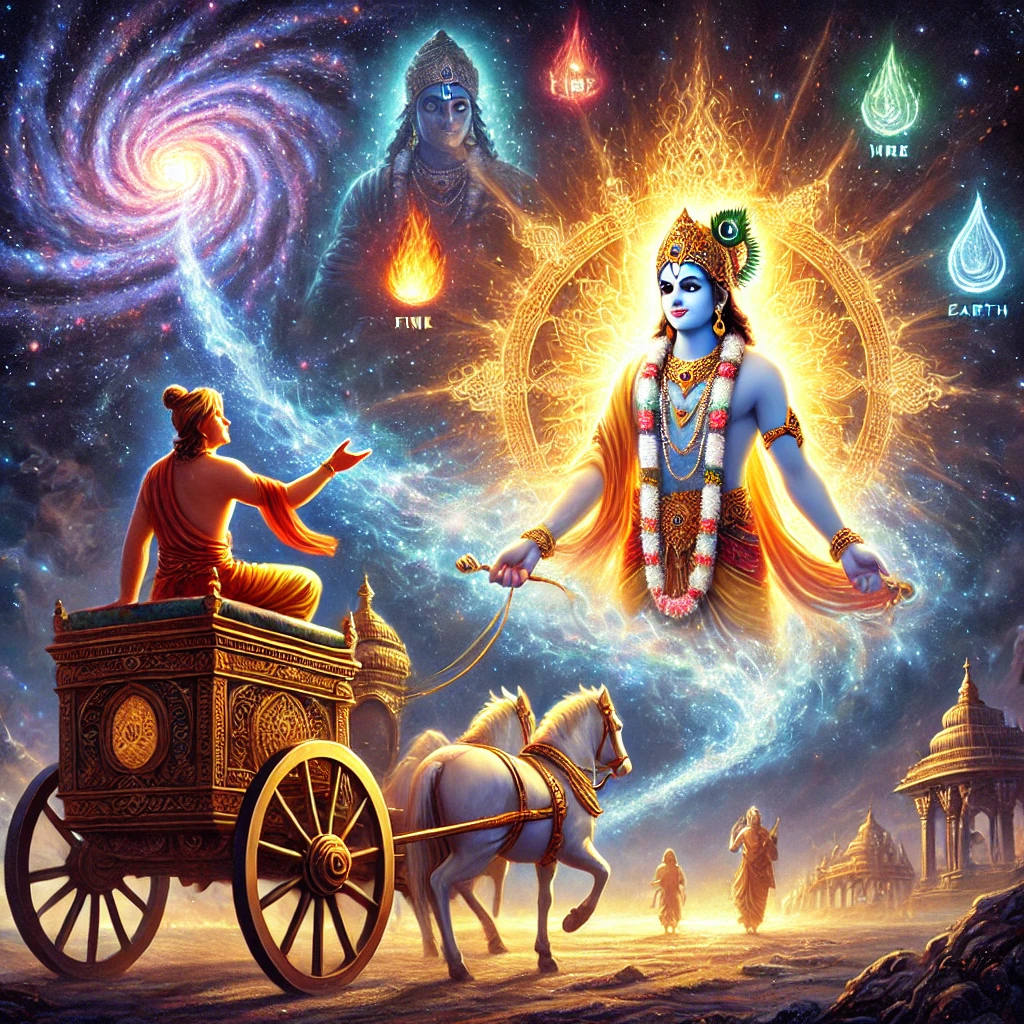

— Jnana Vijnana Yoga: The Yoga of Knowledge and Wisdom
In Chapter 7 of the Bhagavad Gita, Lord Krishna shifts the focus to a more direct understanding of the Divine Self. This chapter is titled Jnana Vijnana Yoga, which translates to The Yoga of Knowledge and Wisdom—a deeper dive into knowing who God is, how He pervades the universe, and how we can recognize the Divine both within and outside ourselves.
Krishna reveals his true nature and how the material and spiritual worlds are both rooted in him. More than a theological exposition, this chapter provides spiritual clarity for those seeking truth, and emotional strength for those navigating life’s complexities.
Here are five key lessons from Chapter 7 that can reshape how we live, think, and relate to the world.
1. True Knowledge Goes Beyond Facts—It’s the Wisdom of Oneness
Krishna explains two types of knowledge:
He emphasizes that true spiritual understanding comes not just from learning scriptures or philosophy, but from experiencing the divine presence within and around us.
Verse 2: “I shall now declare to you in full this knowledge and wisdom, knowing which nothing further shall remain to be known.”
Lesson: Don’t just accumulate information—seek inner realization. Whether you’re reading scriptures, listening to a teacher, or praying, the goal is to feel connected to something greater than the ego. The more you feel that unity, the more peaceful and powerful your life becomes.
2. The Divine Is Present in All Aspects of Creation
Krishna tells Arjuna that everything in nature—earth, water, fire, air, space, mind, intellect, and ego—is a part of his lower nature (prakriti). But beyond this is his higher, divine energy, which sustains life itself.
Verse 4–5: “Earth, water, fire, air, ether, mind, intellect and ego—these eight constitute My separated material energies. But know that My higher nature is the living beings who sustain this universe.”
Lesson: You are not separate from the universe. The divine energy flows through you and everything you see. When you treat nature, people, and even your own body with reverence, you align yourself with the sacredness of life.
3. Many People Seek, But Few Seek With Depth
Krishna speaks about four types of people who approach him:
Among them, Krishna praises the Jnani (the wise)—those who love and seek Him with no material motive.
Verse 16–17: “Among these, the wise one, who is ever steadfast and whose devotion is single-minded, is the best.”
Lesson: It’s okay to turn to the divine when you’re struggling or in need—but as you grow, try to shift from asking for things to simply seeking connection and clarity. That shift transforms your relationship with God from transactional to transformational.
4. God Can Be Found Through Devotion, Not Just Intellect
Krishna says that even though He pervades everything, very few recognize Him. He is hidden from those who rely only on intellect and ego. But for those who surrender with love and humility, He becomes fully accessible.
Verse 25: “I am not manifest to all, being veiled by My divine power. This deluded world knows Me not, the unborn and imperishable.””
Lesson: You don’t need to be a scholar to experience the divine. A pure heart, sincere intention, and quiet surrender reveal more truth than endless analysis. Devotion makes the invisible visible.
5. Everything Begins With Faith in Something Greater
Krishna explains that faith—even when directed toward different gods or paths—is still rooted in Him, because He is the source of all belief and worship. He accepts all sincere devotion, regardless of the form.
Verse 21–22: “Whichever form a devotee seeks to worship with faith—I make that faith steady.”
Lesson: No path of sincere worship is wrong. Respect different beliefs, because behind every genuine prayer or ritual lies a heart reaching out to the same source. When you practice your own path with humility, it naturally brings unity, not division.
Final Thoughts
Chapter 7 of the Bhagavad Gita invites us to move beyond just rituals or reading, into a relationship with the Divine—deep, personal, and filled with reverence. It tells us that God is not distant or abstract. He is within the wind, the sun, the silence, the joy, the suffering—and even within our seeking.
As you go through your day, remember:
“Among thousands of men, one may strive for perfection; and among those who strive, only a few truly know Me.” — Verse 3







